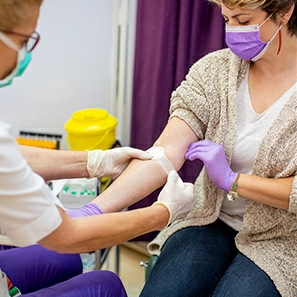Why Screening Tests Are Critical for Good Health

During your annual checkup, your doctor or primary care provider (PCP) may order additional tests to check for health concerns. The idea of these screenings might make you nervous, but this shouldn’t be a reason to delay care.
In fact, now’s the time to see your doctor and get the preventative care you need – especially if you delayed an appointment because of COVID-19. Screening tests are some of the best ways you can maintain good health as you age.
But if the idea of additional screenings still worries you, Munson Healthcare is here to help.
Here are just a few things you should know about common screening tests. Hopefully this breakdown calms your nerves and helps you feel confident in scheduling your next routine care appointment.
Why are Screening Tests Helpful?
Screenings are one of many tools your physician will use to assess your health and to help find any hidden medical conditions.
“The screening exams we use as your partners in healthcare are designed to catch early disease and improve your treatment options and outcomes,” said Brian McComb, DO, Family Medicine Physician at Munson Healthcare Manistee Primary Care. “These tests are critically important for your overall health and wellness.”
Even screenings that may not be 100% accurate in all cases are better than not having them at all. You and your doctor will base your screening test schedule on your age, overall health, family health history, and personal health history.
“The COVID-19 pandemic has slowed screenings down, but now is the time to act,” Dr. McComb added. “Positive cases are declining, and the number of people vaccinated in our community is rising. Please contact your PCP to schedule a checkup appointment as soon as possible.”
What are Some Common Screening Tests?

Cholesterol
Cholesterol is a waxy, fat-like substance that can be found in all parts of the body. Cholesterol screening is done with a blood test. If your cholesterol results are high, you have a higher risk for cardiovascular disease than people with cholesterol in the normal range. You can lower your risk for heart disease by lowering your cholesterol.
Pap test
Pap tests, or Pap smears, are samples of cells taken from the cervix. The sample is looked at under a microscope to check for any changes that might mean cervical cancer. It can find cancer at a stage when there are often no symptoms.
Even if Pap results are abnormal, that may not indicate cervical cancer. Some expert groups also recommend certain women get screened for HPV (human papillomavirus) at the same time the Pap test is performed.
Prostate-Specific Antigen (PSA) test
This blood test measures the prostate-specific antigen (PSA) levels in the blood. Antigens are any substances that make your immune system react. PSA levels can be higher than normal if you have prostate cancer, but other problems can cause a high PSA – including certain medications and diets that include large amounts of red meat, dairy, and alcohol. Talk with your healthcare provider about the pros and cons of PSA screening.
Mammogram
Many expert groups recommend mammograms for breast cancer every 1-to-2 years after age 50 (or sooner if you have a family history of breast cancer). This imaging test is performed along with a clinical breast exam.
Colonoscopy and other colon cancer screenings

For people at average risk, the American Cancer Society recommends starting colorectal screening at age 45. Multiple tests are available and are used at different times. They are:
- Colonoscopy (most accurate and recommended every 10 years)
- Fecal Immunohistochemistry test or FIT (every year)
- Flexible Sigmoidoscopy (every 5 years)
- CT Colonography (every 5 years)
- Fecal DNA Testing (every 3 years)
Talk with your healthcare provider about which tests are best for you. Keep in mind you will need a follow-up colonoscopy if you choose any test but colonoscopy and have an abnormal result.
Diabetes or prediabetes
The American Diabetes Association recommends that all adults be screened for diabetes or prediabetes starting at age 45. This is true no matter how much you weigh. You should also get screened if you are overweight or obese and have one or more other risk factors for diabetes.
Scheduling Your Next Appointment
Don’t delay your care. Munson Healthcare doctors, nurses, and medical specialists are here for you across 11,000 square miles of northern Michigan. Ready to help you feel your best for whatever comes next.
Contact your doctor or PCP to schedule your annual exam. If you don’t have a family doctor, use our online Find-A-Doctor tool or call our Ask-A-Nurse line at 231-935-0951. Our team will help you find a physician nearby.
If you have immediate questions about your specific symptoms, call Munson Healthcare Ask-a-Nurse at 231-935-0951. Our nurses are answering questions 24 hours a day at no charge to you.